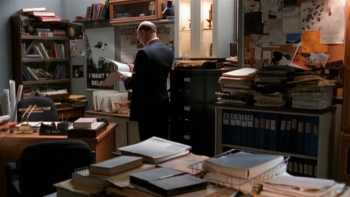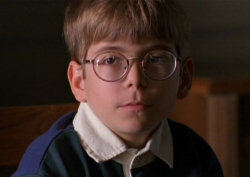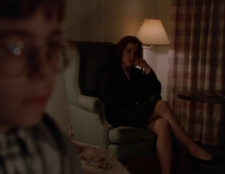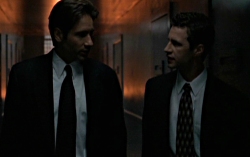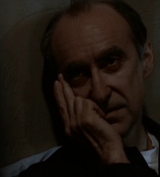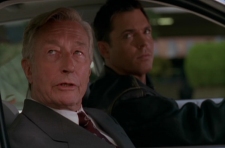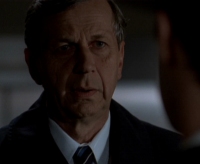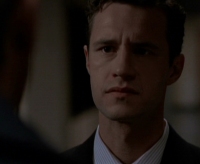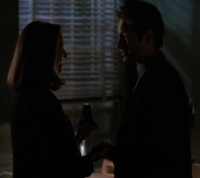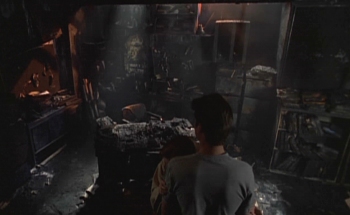5X20: The End

|
||||||||||||||||||||||||||||||||||||||||||||||||||||||||||||||||||||||||||||||||||
Case Profile Tagline: “The End” Young chess prodigy Gibson Praise attacts attention; the Syndicate attempts to assassinate him. The Cigarette-Smoking Man returns from Quebec with plans to coach his son Jeffrey Spender, who comes to heads with Fox Mulder. Diana Fowley, an ex of Mulder’s, is also back. Mulder understands that Gibson can read minds and that he’s proof of the alien presence on Earth that Mulder & Scully have been looking for. Mulder attracts the attention of the Justice Department to help make his case. The boy ends up being abducted by the Syndicate, the X-Files are shut down, and the Cigarette-Smoking Man burns down the X-Files office.
|
||||||||||||||||||||||||||||||||||||||||||||||||||||||||||||||||||||||||||||||||||
|
Field Report
This is the end… of the Vancouver era for the X-Files! Carter pens an episode tributing that by coming back to Vancouver trademarks, like the underground garage or the ‘hospital’ building whose facilities were used for dozens of different scenes across five years. The opening, the famous chess game with 17,000 extra/fans from all over the world, is set in Vancouver — the first and last time the X-Files address the city by its true name. A case that would be “the key to everything in the X-Files” and the burning of the X-Files office are also symbolic of this ending. With Jeffrey Spender and now Diana Fowley, the cast of the X-Files grows in complexity. Gibson Praise After Emily (5X07: Emily), season 5 presents us with another youngster that is the focus of our agents. Seeing Gibson walking hand in hand with Scully only reminds of the traumatic experience with Emily (Gibson: “I didn’t like those tests. I didn’t like being in the machine.” Scully: “Hmm… They’re a little scary, aren’t they?”).
Gibson Praise became a chess expert by reading the opponent’s mind, he would be helpless against a computer. He is put through enough tests to convince everybody, even Scully (!), that there’s something special and paranormal with this twelve year old. “Zener cards” are the familiar set of five cards (circle, cross, waves, square, star) used in tests for extra-sensory perception (ESP), invented by the american psychologist Karl Zener (not the same Zener as the Zener diode!). “Clairvoyants” have an ESP ability where information is transferred through a means different from the five human senses, commonly mind reading. Scully also conducted conventional scientific tests, “neurological tests. Mapping of brain functions using a very high resolution EEG“: this is an electro-encephalogram, the monitoring of brain activity by placing electrodes on the patient’s head. The tests showed “extraordinary activity” in “an area of the temporal lobe that neurophysicists are calling the ‘God module’“, “an area of the brain that we are only beginning to understand“. Indeed, the nickname ‘God module’ was given to this area of the brain after a study done in 1997 in San Diego, where religious thoughts, religious experiences or hallucinations were linked to an increased activity of this specific part of the brain — a study that attempted to base the spiritual in the material world. A very active ‘God module’ would thus be the key to mind reading and, as per Mulder the key “to all spiritual unexplained paranormal phenomena. The key to everything in the X-Files“. This is quite a shortcut, but indeed it is the first time the agents come across such undeniable “quantifiable scientific proof of everything Agent Mulder and I have investigated over the past five years”. To further that, the shooter says that “the kid is a missing link”. Mulder takes that and concludes Gibson is “genetic proof” of the evolutionary relation between aliens and humans. “Most of us have genes we don’t use. They lie there dormant, turned off. Science doesn’t know what they’re for”: Mulder describes the non-coding or so-called ‘junk’ DNA, which indeed is still a subject of intense research in the genetics field (the ‘C-value enigma’).
The X-Files here introduce for the first time the “long-held but unpopular theory” of the alien origins of mankind, further explored in 6X22: Biogenesis. These dormant genes would be of extraterrestrial origin, the part of us that’s alien. ‘Turning them on’, or ‘activating’ them, ie using the genes to code for proteins, would coincide with the appearance of traits of extraterrestrial nature. Clairvoyance is one of them, further exhibited by the ‘hybridized’ Mulder in 7X03: The Sixth Extinction, also associated to temporal lobe activity. Mulder says “the kid’s not superhuman, he’s just more human than human”; this only refers to the observation that Gibson doesn’t have an ability that makes him superior to other humans, he just makes a fuller use of the capacities every human has in him/her — capacities that happen to be of alien origin. The Siberian connection Gibson lives in the Philippines; since his case is treated in Washington, he must be American, but he might have some filipino ascent. This information, which is otherwise useless, must be the remnant of a storyline that never came to be. Originally, The End (and 6X01: The Beginning?) would have been a two-parter titled “Zhigansk” and “Okhotsk“: these are two towns in Siberia, Russia. With this tidbit, the vaccine created in Russian Tunguska, Gibson’s extraordinary abilities, and with the storyline of 8X16: Vienen, one coud elaborate a theory that might wrap all this up. Perhaps originally, The End would have dealt with discovering a naturally occuring human gene that would make one resistant to the Black Oil; transferring this gene to another, or taking the antibodies produced by the gene holder, would be as effective as creating a vaccine against the Black Oil. This gene was supposed to appear in the native population of Siberia, present thousands of years ago. Through heredity and migration, it would have made its way to other regions: Siberian population migrating south to Indochina and the Philippines, and east through Bering to populate the Americas. This would explain why the Anasazi people were an inconvenient threat to the aliens and were wiped out of the picture (2X25: Anasazi), why this trait was eventually expressed by mind-reading in Gibson Praise, and why a genetically pure Mexican tribe would be immune to the Black Oil (8X16: Vienen).
Further extrapolating, the Russian vaccine to the Black Oil that was developed by making tests on humans from the local population of Tunguska, Siberia, would have been made possible thanks to some test subjects holding this gene! A vaccine would have been made using their natural-occuring anti-bodies. It’s a stretch, but a beautiful all-in-one theory! The shooter and the closing of the X-Files The Syndicate wants to do away with Gibson as he is a too obvious proof of presence of extraterrestrials on Earth. But why attempt to kill him in such a public and mediatized gathering like an official chess competition? If the shooting had succeeded, an innocent boy would have been killed; the public perception would be that the intended target was the Russian chessmaster. The attention the Russian would have got would distract attention from the real reason of the crime. The result was that a Russian citizen was killed. As Mulder says, Spender is lucky he’s “not defusing some international incident kissing serious Russian ass” because the attention was indeed brought on Gibson, all thanks to Mulder. The shooter is from the National Security Agency (NSA), like the First Elder’s Red-haired Man (3X10: 731) and obviously knows and fears the Cigarette-Smoking Man (he recognizes the Morley paper wrappers). He was trained in the “Special Forces“, which is an elite branch of the US Army, the so-called ‘Green berets’. He was in “Grenada“; Operation Urgent Fury was an invasion of Grenada (in the Caribbean Sea) done by forces from the USA and other Caribbean countries to overthrow the military revolutionary government that was just formed. He was also in “Zaire“; in 1996, warfare and genocide in Zaire and Rwanda prompted the dispatch of an international peacekeeping force, with the US Special Forces being represented.
And he was even “inside Saddam’s palace with a hit squad when they started raining bombs down over it yet you failed to kill him as well”: a failed superblack assassination attempt on Saddam Hussein during the Gulf War of 1990-91. Mulder promises him immunity. The stakes are very high and Mulder values the case of Gibson Praise very much, so he presses Skinner to contact the Justice Department and the Attorney General on giving the shooter immunity in exchange of everything he knows. As Fowley says, “You’re allowed to investigate the X-Files as an indulgence. But draw the wrong kind of attention and they’ll close you down.” Indeed, the small number of agents employed in the X-Files and its high rate of success in the cases dealt with (1X20: Tooms) is the only thing that’s kept the X-Files going (see also 7X22: Requiem). This ambitious move on Mulder’s behalf ended up having the X-Files closed once again, this time apparently for good. The shooter is, well, shot dead in jail by the Black-haired Man, a lackey of the CSM that we’ll encounter again (Fight the Future, 7X15: En Ami). “Instructions from the Justice Department to close down the X-Files” arrive, there are talks of “reassignment” for Mulder and Scully, and to top this off, the CSM radically burns the X-Files office. Five years’ worth of work gone up in flames. Interstingly enough, the only file the CSM takes before setting the fire is the one on Samantha. Apparently he doesn’t know much more than Mulder does on the subject (see 7X11: Closure)! The return of the Cigarette-Smoking Man and familial dynamics So the CSM returns from his exile in snowy Quebec and joins the Syndicate again. We can see a scar on his sternum, what’s left of the stitching operation that must have followed his shooting in 5X03: Redux II. Why would the Syndicate call him for a case like Gibson Praise? (“you have a job for me”) How is his expertise needed, especially since his credibility was diminished enough for the First Elder to order his shooting? It’s likely that the Syndicate found out the CSM had survived and had started pulling strings again (with Jeffrey for example).
Unless they killed him he would start being a liability; so they preferred to take him back in the fold so as to ‘control’ his actions better (“Can we count on you?”). The First Elder is highly hypocritical since he still denies involvement in the whole shooting incident. But the CSM is back with a vengeance, he’s much more straightforward now and he doesn’t hide his dislike for his fellow conspirators (“My work is just beginning”, “You think you know my interests?”). Many corpses follow his return and accout for his radical methods (the shooter in jail, the marshall protecting Gibson). This is contrary to the Well-Manicured Man’s methods: CSM: “You’ve never had the stomach for our business.” WMM: “Just not for your practices.” CSM: “I’m a necessity. The complement to your cowardice.” However, this vengeance storyline won’t be exploited much in future episodes (he didn’t have much time either given how fast the Syndicate went up in flames — 6X12: One Son). Following their mutual understanding in 5X14: The Red and the Black, Krycek is now the WMM’s sidekick; the WMM seems to be coaching him for future ascension in the ranks of the Syndicate (“you may need [the CSM] in the future“). Ratboy Krycek has found a way to survive again. After failing to bring his first son (Mulder) under his wing, the CSM turns to his other son Jeffrey. The CSM assigns the Gibson Praise case to Jeffrey, risking public exposure of the matter, something the Syndicate doesn’t appreciate at all. But for the CSM now, it’s only “part of the game“. “It’s all a game. You just take their pieces, one by one until the board is clear.”
The CSM returns to Washington and quickly presents himself to his son. In keeping with the chess theme of the episode, he gives him the basic rules of gaining power and Machiavellian politics: “Control the board. Know which men to sacrifice and when.” He turns his own personal characteristics into an ideal that must be followed: “Don’t become part of someone else’s cause or crusade. Pursue your own self interest. Always.” The CSM knows knowledge is power, and knowledge can be gained through “access, Agent Spender. It’s about access. It’s what I can give you. It’s what can make you. It’s why I’m doing this for you.” Krycek has learnt this as well, and in a way he is also the spiritual son or heir of the CSM. Then comes the final revelation that he is Jeffrey’s father (no, it’s not a “Star Wars: The Empire Strikes Back” (1980) reference, this is a theme than can be found in many myths and hero journeys!). The CSM’s plan continues into next season… Even though the CSM flatters Jeffrey (“You’re a bright boy”), the tension between Mulder and Spender only builds up and up. Spender wants to shut Mulder off ‘his’ case; he is “ambitious” and “arrogant“. Mulder is a much better profiler and psychologist than the inexperienced Spender is. This is very much evidenced by the scene where Mulder wants to talk alone to the shooter and gets rid of Spender by sending him to get food, only to take the food away as Spender returns. Spender has a lot to learn, but he’s caught in a web between his own stressful perception of others and the machinations of his father. Mulder ends up becoming suspicious of Spender: Spender has had the case assigned to him ”from somewhere outside the Bureau“, he is seen talking with the presumed-dead CSM (Mulder: “You don’t know who you were talking to? You’re lying.” “Now I’m beginning to wonder what you’re protecting.”). But in fact Mulder has got a much better insight than Spender on this; Spender is overwhelmed by the events, he’s only trying to catch up with the CSM and Mulder; this foreshadows his failure in 6X12: One Son. Ironically, what he says to Mulder about his ancient “alien astronauts” is what Mulder himself would have said only a few months ago, after the Redux turn of events: “You think that’s what you heard? You led him, Agent Mulder. Now you’re letting yourself be led!” Diana Fowley Diana Fowley “has some kind of background in para-science” and, as per Frohike, was “Mulder’s chickadee when he just got out of the Academy”. She left the USA in 1991, which places their relationship from 1988 to 1991. It’s likely they were engaged or married for some time (see the ring on Mulder’s finger in 5X15: Travelers, which takes place in 1990). Given what we know of the past and personal life of Mulder — which seemed to be XF, XF and only XF — it’s entirely likely he could have hid this from Scully. However, “she was there when he discovered the X-Files“, and as we’ll come to learn in The Beginning, they found the X-Files together.
The cases Diana describes must have been the first X-Files they investigated together prior to Scully’s arrival in 1992: “Agent Mulder and I spent some time in psychiatric hospitals. There were some patients serving criminal sentences who we felt had been misdiagnosed.”, “I’ve witnessed clairvoyants who were over 90% accurate and seen telepathy being demonstrated”. Weird that Scully wouldn’t have come across her name when studying past files: that’s in the scriptwriter’s difficult exercise of re-writing the past retroactively. Then Fowley got a “legat appointment […] in Berlin”: legats, or Legal Attachés, are FBI agents posted in 70 cities all over the world gathering intelligence on intenational crime. Diana got “an assignment in Europe after the Wall came down when the director stepped up foreign terrorism concerns“, to “get inside the head of too many Arab terrorists” (this is most topical in a post-September 11 world!). But this is only the official side of things; as we’ll come to know, Fowley was involved with the Syndicate. The fact she discovered the X-Files with Mulder could have been a manipulation of the CSM to get his son on the job. Now in exactly the same way he calls her back to coach his other son in this ‘X-Files academy’ which, for him, is supposed to train the agents for a possible place in the Syndicate! With such relations to the Syndicate, it’s odd then that Diana got shot at the end. The man who shot her, most likely the CSM’s Black-haired Man, “killed a US Marshal” in the process and perhaps his initial plan was to wound Fowley enough so he could take Gibson from the FBI — like in 4X24: Gethsemane with Babcock, whom his associate Ostelhoff shot and wounded in order to support the authenticity of the alien corpse. Diana says that “[Scully]’s not what I would call an open mind on the subject” of the paranormal, but Mulder still defends her blindly. The teasing Gibson does with Mulder is funny and reveals that Mulder thinks about one of either Dana or Diana, and that one of them thinks about him… Of course from the beginning we’re supposed to dislike Fowley as we identify with Scully. This is by far the most romantic-heavy episode to date, with Scully obviously jealous — leading to some shippy moments in Fight the Future.
Surveillance Recodings
Skinner: “What do you hope to find? I mean, in the end.” Gibson: “I know what’s on your mind. I know you’re thinking about one of the girls you brought.” Scully: “Analyze the data. With an eye to the parapsychological.” (Gibson is pathetically absorbed by TV shows) Diana: “Put a TV in front of him and he turns right into a normal kid.” Cigarette-Smoking Man: “Control the board. Know which men to sacrifice and when. […] Don’t become part of someone else’s cause or crusade. Pursue your own self interest. Always.” Mulder: “If what Agent Scully’s found is true and I have every reason to believe that it is, then the answers I might have spent a lifetime searching for may fall together like a million puzzle pieces.” Spender: “You think that’s what you heard? You led him, Agent Mulder. Now you’re letting yourself be led!” Cigarette-Smoking Man: “It’s all a game. You just take their pieces, one by one until the board is clear.” |
||||||||||||||||||||||||||||||||||||||||||||||||||||||||||||||||||||||||||||||||||
|
E.T.C 2004-2008
|
||||||||||||||||||||||||||||||||||||||||||||||||||||||||||||||||||||||||||||||||||


